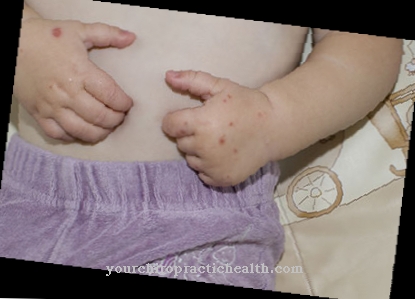Of the Tongue cancer or Oral carcinoma belongs to the rare types of tumors in the mouth area. It is malignant and mostly a cancer that originates from the uncornified layers of the mucous membrane of the tongue and is probably caused by risk factors such as smoking and alcohol consumption, as well as chronic inflammation.
What is tongue cancer?
In case of illness Tongue cancer the front, movable part of the tongue can be affected as well as the firm rear base of the tongue. Tongue cancer develops in the squamous epithelium, which is a non-horny, flat layer of cells that covers the mucous membranes in the mouth, throat and nose.
The tumor formation is not uniform. Tongue cancer can appear as a flat tumor on the mucous membrane as well as as proliferating structures that are clearly visible in the mouth area. In the course of time, ulcers of the tongue develop, the tumor restricts the mobility of the tongue and thus also the ability to speak. If left untreated, tongue cancer affects other areas of the oral cavity and forms metastases in the lymph nodes.
causes
The exact causes of Tongue cancer have not yet been clarified. The risk groups include men and women, although the number of men suffering from tongue cancer is significantly higher after the age of 60.
The combination of tobacco consumption and alcohol is a particular risk factor. The reason could be permanent irritation of the oral mucosa, which ultimately favors the development of tongue cancer. Chronic inflammation of the oral mucosa for other reasons also increases the risk of developing tongue cancer.
People who suffer from lichen ruber nodules are also affected by tongue cancer. Poor oral hygiene, with the resulting high bacterial counts and inflammation, also promote the development of tongue cancer.
Symptoms, ailments & signs
Tongue cancer is associated with hardly noticeable symptoms in the early stages. Symptoms suggestive of a disease only appear gradually. Most patients at advanced stage feel like they have a foreign object in their mouth.
Unlike many people affected, pain does not occur solely on the tongue. The entire mouth and throat area is affected. If, for example, liquids are consumed, irritation occurs at the beginning, which increases as the disease progresses. Swallowing is only possible with pain. Tongue cancer is not infrequently associated with bad breath.
Those who brush their teeth or use mouthwashes can only provide short-term relief. The bad breath keeps coming back. Those affected often taste blood too. The tongue changes in tongue cancer. She has ulcers, wounds, and spots. The latter appear in white or red contours. Bleeding can also occur.
Many sufferers mistakenly attribute the blood to bleeding gums. People with a suspicion clean the tongue with cotton wool to get an overview. Difficulty speaking occurs at an advanced stage. Syllables can no longer be formed clearly or only with pain. Food gain is also difficult. The lymph nodes are often enlarged.
Diagnosis & course
Among the painless symptoms of Tongue cancer in the early stages are red or white spots that do not go away with thorough oral hygiene.
A persistent scratchy feeling in the throat indicates a tongue tumor and, in rare cases, an earache. More common are sore or bleeding spots on the tongue, numbness, or pain when swallowing.
Tongue cancer is initially painless, but is accompanied by significant impairments as the tumor spreads. The development is well advanced when tumors are already growing on the tongue, which can also form ulcers.
When diagnosing tongue cancer, the doctor first does a visual diagnosis of the front part of the tongue. The base of the tongue is examined with mirrors. Tissue samples from suspicious areas are used for the basic diagnosis of tongue cancer, which is then followed by the exact size determination in the imaging process.
Complications
Since tongue cancer is a tumor, in the worst case it can lead to death of the person concerned. This case occurs especially when the cancer is recognized very late and metastases have already formed. As a rule, those affected suffer from a very uncomfortable feeling of foreign bodies in the mouth area and on the tongue.
This leads to difficulty swallowing, so that those affected are severely prevented from taking food and fluids normally. This can also lead to deficiency symptoms or dehydration. Furthermore, patients with tongue cancer also suffer from sore throats, which cannot be relieved with the help of medication.
Speech disorders and severe swelling of the lymph nodes can also occur and have a very negative effect on the quality of life of the person concerned. Most patients also suffer from severe earache and, as the disease progresses, from a bleeding tongue. Tongue cancer can be treated with surgery.
In most cases, the subsequent chemotherapy is associated with a number of side effects. Because part of the tissue is removed, the person affected is significantly restricted when eating or speaking. If the treatment is successful, however, the life expectancy of the person affected is not negatively affected.
When should you go to the doctor?
If the pain in the mouth persists, there is already cause for concern. In most cases, these health problems are harmless and resolve. Repeated inflammation, discoloration or swelling indicate an existing disease. A doctor's visit is necessary so that the cause can be clarified. A doctor should be consulted if there are disorders of sensitivity, hypersensitivity to stimuli such as heat or cold, or impairment of the movement of the tongue.
General malaise, decreased performance and increased tiredness are further signs of an existing health disorder. If there is a continuous increase in health problems, a doctor should be consulted. Loss of appetite, apathy and weight loss are also indications of an illness. If there are mood swings, behavior problems and an unusual bad breath, there is a need for action.
In particular, smokers or people who consume alcohol regularly belong to the risk group for various diseases. You should have your health checked at regular intervals so that irregularities can be responded to as quickly as possible. In addition, all people should take part in the preventive examinations offered at regular intervals in order to enable early detection of cancer or other health disorders. Bleeding of the gums or swelling of the lymph are to be interpreted as a warning signal of the organism and should be examined by a doctor.
Treatment & Therapy
With an early diagnosis of Tongue cancer the treatment is carried out with surgical means. The tumor and the tissue surrounding it are removed. Additional treatment with radiation or chemotherapy is not always necessary.
If the tongue cancer has already spread further, the metastases in the lymph nodes are irradiated in addition to removing the tumor in the tongue. The physical impairments of the affected patient are mostly minor in the early stages. The ability to speak in tongue cancer at the front of the tongue is hardly or not at all affected.
After the surgical wound has healed, there are no restrictions on food and fluid intake. Advanced tongue cancer, on the other hand, requires measures that involve removing large parts of the tongue. In addition to the painful wound healing, the ability to speak is then clearly and irreversibly restricted.
Food intake can also become problematic and lead to severe weight loss. Numbness as a result of radiation therapy is to be expected. In the case of inoperable tumors or advanced tongue cancer, treatment is carried out with chemotherapy, which is intended to prevent further growth and combat metastases.
You can find your medication here
➔ Medicines for smoking cessationprevention
Preventive measures to prevent Tongue cancer consist in elimination of risk factors and thorough oral hygiene. The combination of alcohol and tobacco should be avoided. Thorough teeth cleaning and regular visits to the dentist to diagnose and treat inflammation of the oral mucosa also serve as a preventive measure.
It is advisable to supplement daily dental care with a special tongue cleaner. If there are unexplained changes in or on the tongue, a specialist doctor must be diagnosed who can treat previous illnesses and rule out any suspicion of tongue cancer.
Aftercare
An essential task of follow-up care for tongue cancer is the early diagnosis of a relapse. This is about the recurrence of a carcinoma after treatment. That is why regular examinations are carried out during follow-up care: every three months for the first two years and every six months for the following three years.
In addition, the patient should continuously pay attention to changes in the mouth area and consult a doctor immediately if anything is abnormal. To prevent a relapse, smoking and excessive alcohol consumption should be avoided. Careful oral hygiene is also essential for prevention.
After cancer treatment, rehabilitation helps the patient recover and allow them to return to normal life. Special follow-up measures are necessary if larger pieces of tissue had to be removed from the tongue during the operation. Even if the function of a damaged tongue can usually be restored through plastic reconstruction, problems often arise when speaking or swallowing.
These patients should seek the help of speech therapists. In addition, cosmetic impairments in the mouth area can put a strain on the patient's psyche. This may make psychological support necessary. Relatives can also provide valuable help for mental recovery.
You can do that yourself
Some healers advertise alternative treatment options and self-help techniques for people with cancer. These don't have to be fundamentally wrong. Alternative treatment on one's own responsibility is very risky. Your use by the sick person should be discussed with the attending physician. This will weigh up with the patient whether a supplementary treatment makes sense.
The sick person can also take measures to support the medical treatment and improve their quality of life during the treatment. In the case of tongue cancer, this includes abstaining from alcohol and smoking, as well as careful oral hygiene. The diet should be balanced: high in fiber, vegetables and omega-3 fats. If you lose your appetite during chemotherapy or radiation therapy, you should feast generously on days with a clear conscience. If food intake is restricted as a result of the operation, high-calorie liquid food from the pharmacy can help. This can alleviate weight loss and weakness. Lots of rest and gentle exercise can improve general well-being.
Many patients suffer psychologically from the threat of cancer. The patient can improve his or her mental well-being by confiding in a psychiatrist or clinical psychologist. Social and emotional support from family and friends is also helpful. Many patients also find practicing relaxation techniques or meditation positive for their mental and physical wellbeing.



.jpg)


.jpg)






.jpg)

.jpg)
.jpg)











.jpg)